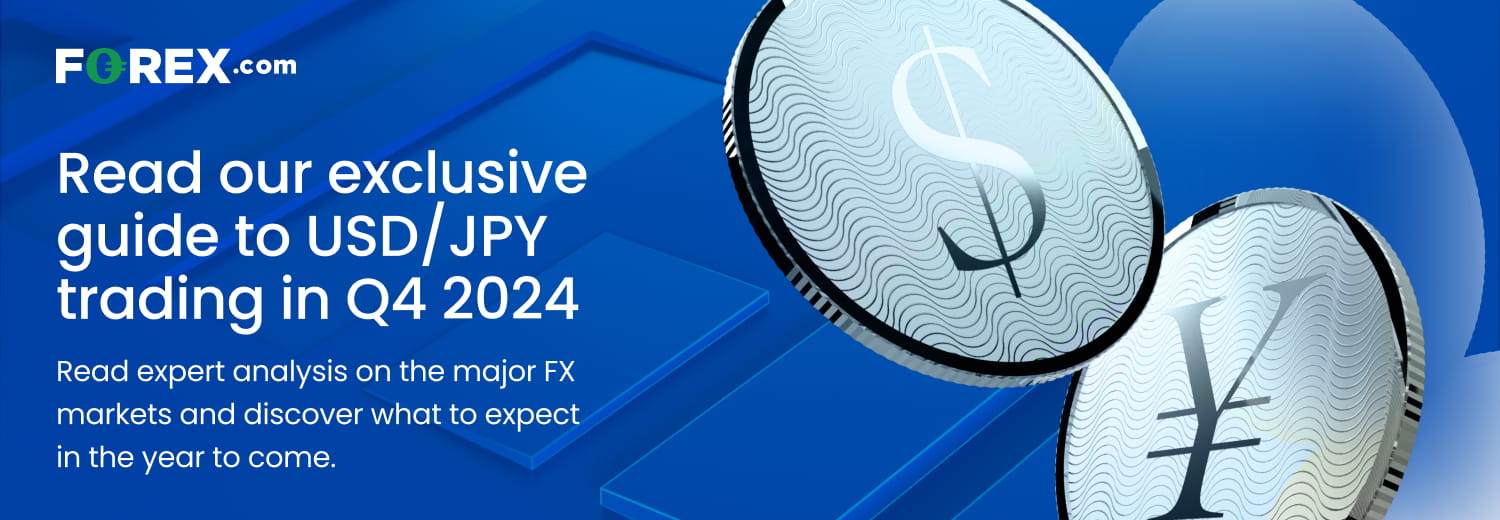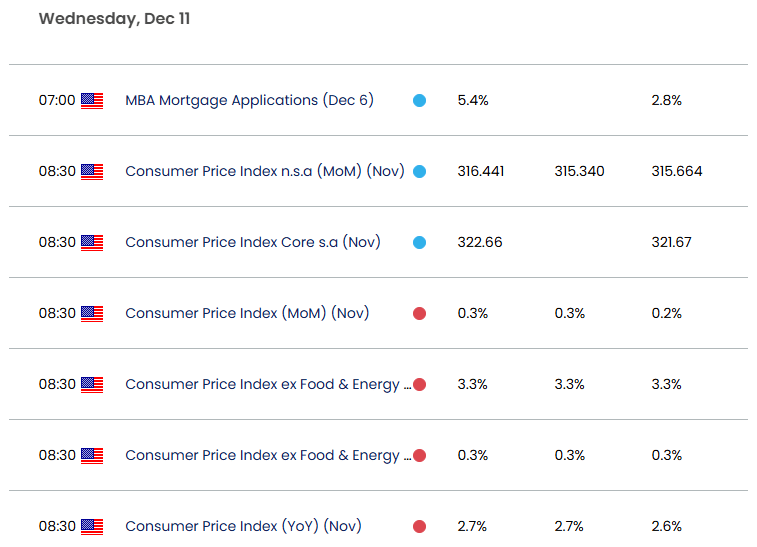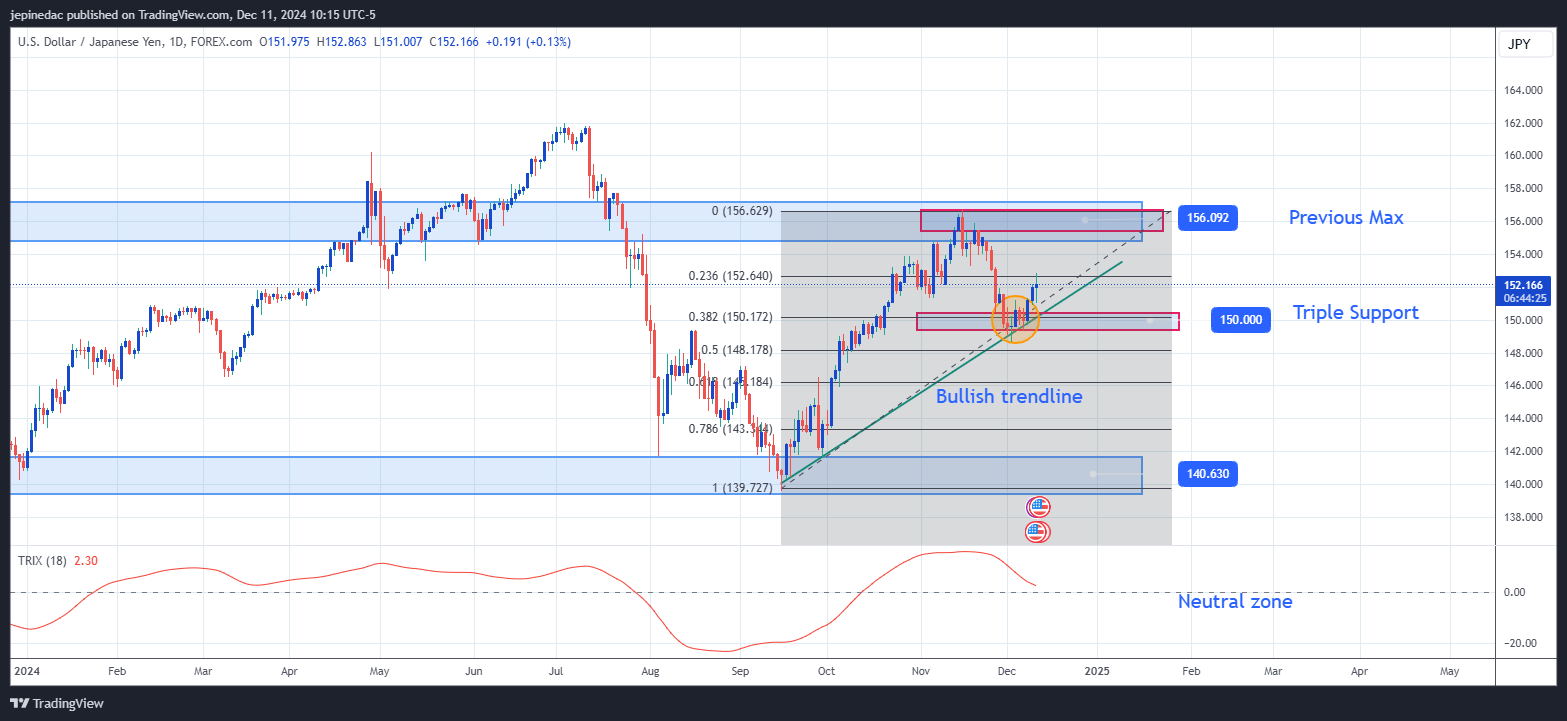- The annual CPI for the United States has shown a level of 2.7% y/y, causing a neutral reaction in USD/JPY movements during the session.
- The market is awaiting the upcoming BOJ decision (December 18-19), which at one point contributed to a remarkable bullish strength for the yen and could present a new bearish opportunity for USD/JPY.
- The 150-yen-per-dollar zone has become highly relevant, and it is crucial for the pair to maintain oscillations above this level to preserve the upward trend.
USD/JPY has risen by approximately 8% since late October, primarily favoring the US dollar and pushing the yen into a constant bearish zone. However, the recent downward corrections can be attributed to the hawkish comments from the BOJ and US rate expectations, causing the USD/JPY to struggle in maintaining the 156-yen-per-dollar peak.

CPI Impact
The latest inflation data for the United States revealed a level of 2.7% y/y (0.3% m/m), as expected by forecasts. The initial reaction in USD/JPY was a 0.35% movement to the upside, eliminating the day’s trend and adopting a neutral stance for the current session. This could pose a challenge to the dollar’s bullish momentum from the past three sessions, continuing the short-term trend.
Economic Calendar – December 11

Source: FX Street
The CPI remaining within the expected range sends a significant message to the market that, for now, inflation is not out of control. This could allow the FED to maintain its low-interest-rate outlook. Currently, the probability of a rate reduction to the 4.25% - 4.5% range has increased to 96% for next week, according to the CME Group probability chart. However, it is crucial to monitor whether this trend continues into January, as an accelerated pace of rate cuts could diminish the US dollar’s bullish strength, putting the USD/JPY’s upward oscillations above 150 yen per dollar at risk.
What Is the BOJ Working On?
Since March of this year, it is known that the Bank of Japan (BOJ) has moved away from its negative interest rate policy. For the first time since 2008, it successfully established an interest rate of 0.25%, a decision made in July.
However, this event has not been replicated since, and now the final BOJ decision, scheduled for December 18-19, is eagerly awaited. Although the government has stated multiple times that a weak yen against other currencies is not favorable, some board members have declared that it is not the right time to accelerate interest rate increases.
According to inflation trends in Japan, a slowdown to 2.3% in October from 2.5% in September has been observed. This downward trend could limit the central bank’s justification for raising interest rates in the short term, potentially weakening the yen once again and sustaining the USD/JPY’s bullish trend above 150.
Inflation Levels – Japan

Source: tradingeconomics.com
On the other hand, it is important to note that the interest rate differential remains at 0.25% for Japan and between 4.5%-4.75% for the United States. This critical detail continues to make fixed-income securities far more attractive in the US market compared to Japan. This generates strong demand for Treasury Bonds, which in turn drives higher purchases of US dollars compared to yen. Over time, this has maintained an upward outlook among investors and consolidated the current bullish trend.
USD/JPY Technical Forecast
The USD/JPY has maintained a steady upward trend since September in the Daily chart, recently reaching a peak of 156 yen per dollar. However, recent economic events have reduced the dollar’s strength, and the price is now oscillating in the 152-yen-per-dollar zone in the last session.
USD/JPY Daily timeframe

Source: StoneX, TradingView
-
Triple Support: The 150-yen-per-dollar zone is not only the closest natural support but also aligns with the current short-term bullish trend and the 38.2% Fibonacci retracement level (which acts as a mathematical support for price movements). This is likely the most crucial level for the current bullish trend, as oscillations below this point could shift the buying strength and pave the way for short positions.
-
Indicator Neutrality: Recent movements in the TRIX (Triple Exponential Average) indicator line have shown two key signals:
- The slope of the line has turned bearish in recent sessions, indicating that the average of the exponential moving averages has decreased, temporarily exhausting the bullish momentum. This could lead to short-term bearish corrections.
-
The line is moving toward the 0 level, which is the indicator’s neutral line and represents equilibrium between the market’s buying and selling strength. A crossover below this level would completely negate the bullish momentum signals and could endanger the current upward trend in the upcoming sessions.
4H timeframe shows that the latest small upward movement on the daily chart forms a bullish trend channel, which is now exhibiting minor upward movements in the 152-zone following the CPI announcement.
USD/JPY 4H timeframe

Source: StoneX, TradingView
-
Key levels:
- 152.70: The nearest resistance that is located at previous levels from the first half of November and the top of the bullish channel. Upward movements surpassing this zone could accelerate bullish momentum within the current steady trend during the upcoming sessions.
- 153.80: Next key resistance level for future upward movements in the short term, worked as a barrier for price movements three times last month and will likely cause neutral movements within the current bullish trend as it progresses.
- 160.00: Key support level for the next sessions. Price movements below this level could jeopardize the current bullish channel formation.